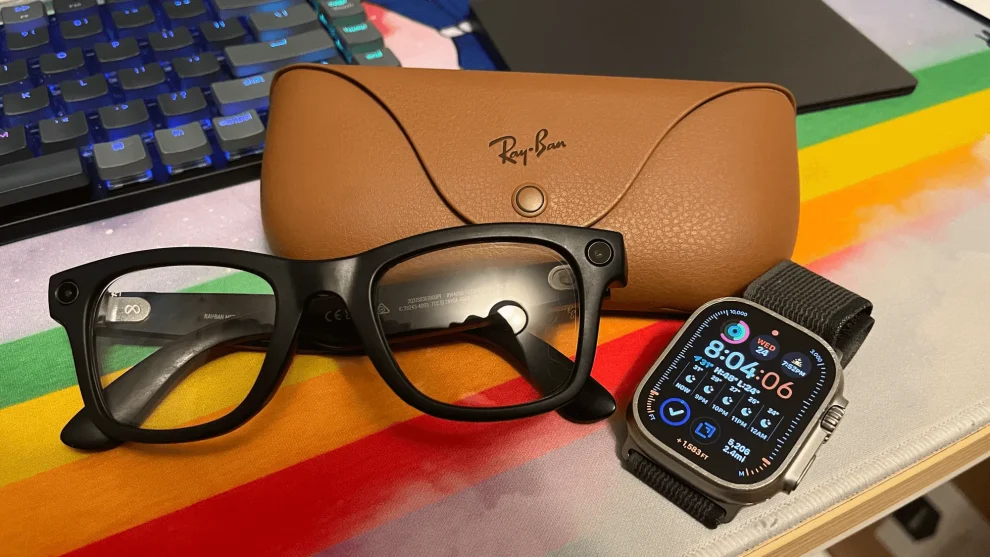At the bustling Meta Connect event this week, Mark Zuckerberg unveiled a series of groundbreaking upgrades to the company’s popular Meta Ray-Ban smart glasses. These enhancements, centered around advanced multimodal AI capabilities, promise to transform the way we interact with technology in our daily lives. From real-time translations to photographic memory, these smart glasses are pushing the boundaries of wearable AI.
As I stood in the demo area, I witnessed a fascinating exchange between Zuckerberg and a Spanish-speaking attendee. The Meta Ray-Bans effortlessly translated their conversation in near real-time, seamlessly switching between Spanish and English.
“This is just the beginning,” Zuckerberg enthused. “We’re starting with Spanish, French, and Italian, but we’re working on expanding to more languages soon.”
The glasses sync with the Meta companion app, allowing non-wearers to follow along on their smartphones. This feature could revolutionize international travel and business communications, making language barriers a thing of the past.
Perhaps the most intriguing new feature is the glasses’ ability to “remember” things for you. In a practical demonstration, Zuckerberg looked at a parking spot number and simply said, “Remember where I parked.”
Later, when he asked, “Hey Meta, where did I park?” the AI assistant promptly replied with the correct spot number. This “photographic memory” function could be a game-changer for those of us who struggle with remembering small but crucial details.
“It’s like having a second brain,” remarked Sarah Chen, a tech analyst attending the event. Imagine never forgetting a birthday or an important meeting again. These glasses could significantly reduce daily stress for many people.”

The upgraded multimodal AI in the Meta Ray-Bans takes contextual understanding to new heights. Users can now ask questions about their surroundings without explicitly stating what they’re looking at.
In one demo, a user peeled an avocado and casually asked, “What can I make with these?” The AI immediately understood the context and suggested various avocado-based recipes.
This seamless interaction extends to other areas as well. The glasses can now recognize and interact with URLs, phone numbers, and QR codes in real-time, further blurring the line between digital and physical worlds.
In a move towards greater inclusivity, Meta announced a partnership with Be My Eyes, an app that connects visually impaired individuals with sighted volunteers.
During the demonstration, a visually impaired woman used the glasses to broadcast her view to a volunteer, who then guided her through reading a party invitation. This feature has the potential to significantly enhance independence for those with visual impairments.
“This partnership could be life-changing for many in the visually impaired community,” said John Doe, a representative from the National Federation of the Blind. It’s heartening to see major tech companies prioritizing accessibility in their innovations.
Meta hasn’t forgotten about style in their pursuit of functionality. The company unveiled a limited edition of Ray-Bans with transparent frames, adding a modern twist to the classic design.
Additionally, new transition lenses were introduced, effectively doubling the glasses’ versatility. “Now you can seamlessly go from indoor to outdoor use without switching glasses,” Zuckerberg explained, showcasing the adaptive lenses.
As the event wrapped up, it was clear that Meta’s vision for the future of wearable AI is ambitious and far-reaching. These new features represent a significant step forward in making AI an integral, yet unobtrusive part of our daily lives.
With prices starting at $300 and nine different frame designs to choose from, Meta is positioning these smart glasses as both a fashion accessory and a powerful technological tool.
As I left the event, the buzz among attendees was palpable. Many were already imagining how these AI-powered glasses could transform their daily routines, from work to travel to social interactions.
While challenges remain, particularly around privacy concerns and the ethical use of AI, there’s no denying the potential impact of this technology. As we move into an era where the line between human and artificial intelligence becomes increasingly blurred, Meta’s Ray-Ban smart glasses are leading the charge, offering a glimpse into a future where our digital assistants are always just a glance away.
Meta’s latest upgrades to their Ray-Ban smart glasses represent a significant leap forward in wearable AI technology. From breaking down language barriers to serving as an external memory bank, these glasses are poised to reshape how we interact with both our digital and physical environments. As the technology continues to evolve, it will be fascinating to see how these innovations impact our daily lives and social interactions in the years to come.
















Add Comment